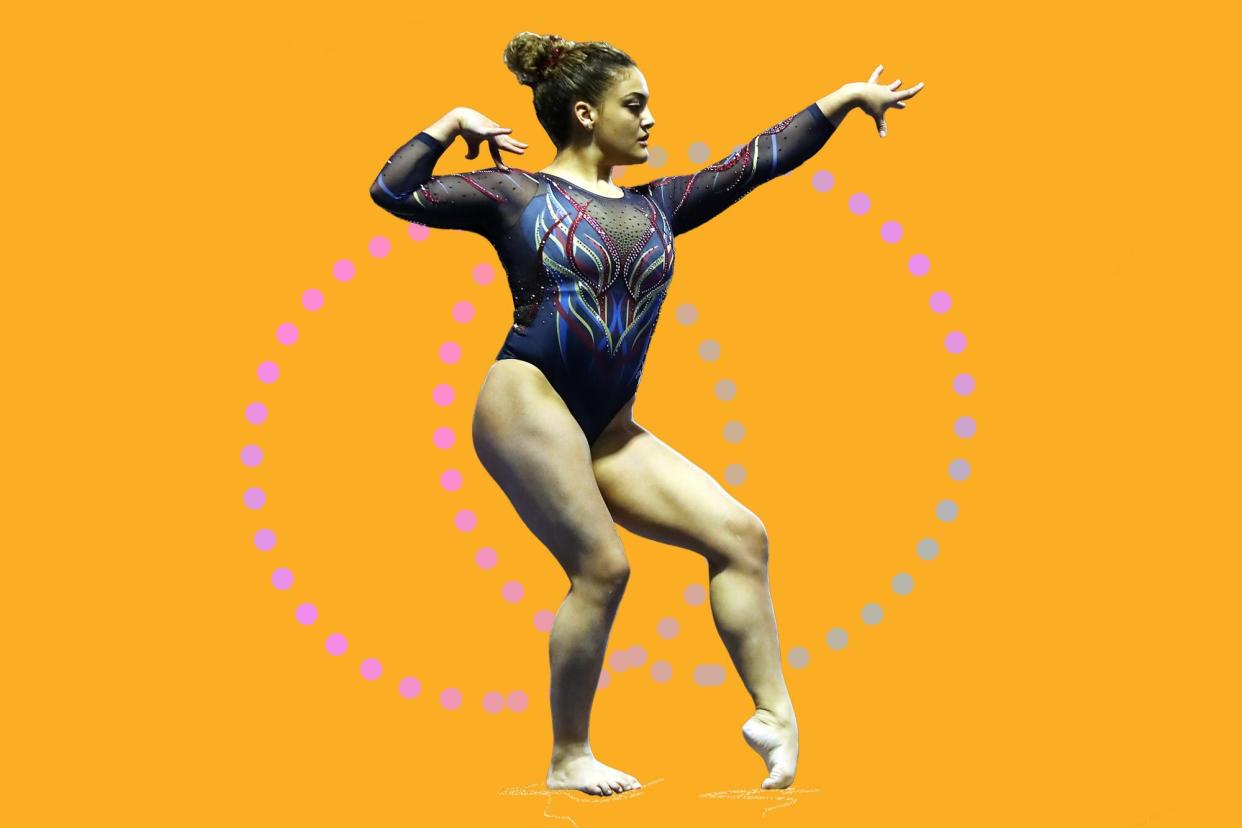How Olympic Gold Medalist Laurie Hernandez Practices Self-Care

- Oops!Something went wrong.Please try again later.
Getty Images
For Laurie Hernandez, her experience at this summer's Tokyo Olympics will fare differently compared to the 2016 Games in Rio de Janeiro, where she won a silver medal for the individual balance beam event and a gold medal with her U.S. Women's Gymnastics Team (aka the "Final Five") in the all-around. Now acting as an analyst for NBC's Olympics coverage, the 21-year-old athlete, who injured her left knee at the U.S. Gymnastics Championships in June 2021 dashing her hopes of competing in this year's Games, is grateful to be part of the festivities in a new capacity.
"It definitely means a lot to still be a part of it," Hernandez recently told Shape. "Yeah, I was trying to go in and compete for the Games, and getting hurt was a loss, but it wasn't a failure. I still get that opportunity to go to the Games, just in a different position and different light. It's a huge opportunity, and again, I think it's just going to be so exciting."
Much like the athletes competing at this year's Games, which were delayed one year due to the COVID-19 pandemic, Hernandez is gearing up for a busy few weeks ahead. Although life on the go is nothing new for the New Jersey native, who also authored the 2017 memoir, I Got This: To Gold and Beyond, (Buy It, $9, amazon.com), Hernandez does recognize the importance of self-care when she's looking to catch her breath. (Related: How Simone Biles Revealed Her Must-Haves In Her Quarantine Self-Care Routine).
"I try to loop [my inner-circe] into how I'm feeling, or especially my agents, saying, 'Hey, I'm having a really rough time right now, is there a way we can space some things apart?' or making sure that I'm checking in with therapy and different things like that," says Hernandez. "My mom's a social worker and a therapist, my sister is a therapist. I see one, so there's no shame in that, and I think journaling has also been a great help to me, too."
In addition to practicing self-care, Hernandez also spends time with those who matter most, notably her father Tony, who was previously diagnosed with type 2 diabetes. Hernandez's relationship with her father and spreading awareness about type 2 diabetes played a pivotal role in her new partnership with Eli Lilly and Company (aka Lilly), a pharmaceutical company that has a wide portfolio of medicines, including Trulicity for diabetes. Hernandez is one of seven Olympians who have teamed with Lilly, and she will also appear in a 60-second advertisement for the health giant that will air Friday during the Olympics' Opening Ceremony.
"This partnership with Lilly means a lot to me because I get to personally talk about my dad, who has type 2 diabetes," says Hernandez. BTW, those with type 1 diabetes cannot make enough insulin, a hormone that allows the body to use glucose for energy. Whereas, those with type 2 diabetes are able to produce insulin, but their bodies are resistant to it. (Related: The 10 Diabetes Symptoms Women Need to Know About).
Among the other athletes who have partnered with Lilly: high-jumper Chaunté Lowe, a breast cancer survivor, swimmer Kathleen Baker, whose mother suffers from migraines, Allysa Seely, a gold medalist from the 2016 Paralympic Games in Rio, swimmer Ryan Murphy, who has also struggled with migraines himself, Oz Sanchez, a six-time U.S. Paralympic medalist whose mother has type 2 diabetes, and beach volleyball player April Ross, who lost her mother to metastatic breast cancer when she was a college student.
"In keeping with the Olympic spirit, it's crucial to remember the importance of health above all and that everyone has their own health journey," Ross recently told Shape.
Ross, a two-time Olympic medalist, will be competing as a pair with Alexandra "Alix" Klineman for the beach volleyball competition at the Games, and she says the duo really utilized the extra year train despite COVID-related challenges. (Related: Your Comprehensive Guide to At-Home Workouts).
"COVID forced us to take some time off the court — probably the longest time I've taken off volleyball since I started junior high," said Ross. "As an athlete, you're trained to see the positive in any adversity and find out how you can use it to your advantage. It was tough, but we found a way to make the best of it."
Ross, who hails from California, created a gym in her garage, where she "worked out really hard every day" and grew stronger. The 39-year-old athlete also filled "[her] emotional cup" by reconnecting with loved ones during the pandemic and keeping her mental health at the forefront. (Related: The Best Therapy and Mental Health Apps).
"I have a couple of mindfulness apps and do some meditating to try and take care of my mental health," said Ross.
With Team USA's first beach volleyball match set for Saturday against China, Ross is for another shot at Olympic glory and doing her best to keep a positive mindset. "I think you can let the pressure get to you and it's there, but part of the mental challenge is dealing with that pressure and keeping it in perspective," she said. "We're just focused on what can help us perform our best."

